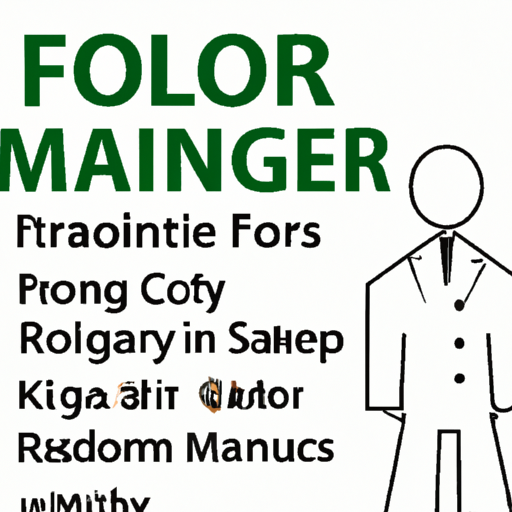The role of a floor manager is vital in ensuring the smooth operations of various industries, ranging from retail to hospitality. This article serves as a comprehensive guide to understanding the responsibilities and qualifications associated with the floor manager job description. By exploring the key tasks, required skills, and potential career paths within this field, individuals can gain valuable insights into this critical position. Whether you are considering a career as a floor manager or seeking to enhance your existing managerial skills, this article provides a valuable foundation for your professional growth and development.
Table of Contents
- Responsibilities and Scope of a Floor Manager
- Requirements and Qualifications for a Floor Manager Role
- Effective Communication Skills for a Floor Manager
- Ensuring a Smooth Workflow as a Floor Manager
- Strategies for Managing and Motivating a Team as a Floor Manager
- Key Organizational Skills Every Floor Manager Should Possess
- Implementing Safety and Security Measures as a Floor Manager
- The Importance of Problem-Solving Skills for a Floor Manager
- The Role of Technology in Floor Management
- Future Outlook

Responsibilities and Scope of a Floor Manager
Responsibilities:
- Overseeing the daily operations of the floor, ensuring smooth and efficient workflow.
- Ensuring the floor is properly staffed, scheduling shifts and assigning tasks to employees.
- Monitoring and maintaining inventory levels, keeping track of stock and ordering supplies as needed.
- Implementing and enforcing safety protocols to ensure a secure and hazard-free working environment.
- Resolving customer complaints and issues in a timely and professional manner.
- Training and guiding new employees, providing ongoing coaching and development opportunities.
- Collaborating with other department managers to optimize operations and improve customer experience.
Scope:
- Ensuring that the floor is visually appealing and well-maintained at all times.
- Maintaining knowledge of current products, promotions, and pricing to assist customers effectively.
- Analyzing sales trends, customer preferences, and employee performance to identify areas for improvement.
- Conducting regular performance evaluations and providing feedback to foster employee growth.
- Preparing reports on sales, employee productivity, and customer satisfaction for management review.
- Assisting with special events and marketing initiatives to drive sales and maximize floor performance.
- Staying updated with industry trends and technologies to implement innovative strategies and enhance customer experience.

Requirements and Qualifications for a Floor Manager Role
As a floor manager, there are specific requirements and qualifications that you need to meet in order to effectively fulfill your responsibilities. The following is a list of key qualifications that we look for in a successful candidate:
- Experience: A minimum of 3 years of experience in a supervisory role within a retail or hospitality environment is required.
- Leadership skills: Demonstrated ability to lead and motivate a team to achieve excellent customer service, sales, and operational goals.
- Excellent communication: Strong written and verbal communication skills to effectively interact with team members, customers, and senior management.
- Problem-solving: Proven ability to identify, analyze, and resolve issues promptly and effectively.
In addition to the above qualifications, the following requirements are necessary for the role:
- Flexibility: Must be able to work a flexible schedule, including evenings, weekends, and holidays.
- Physical stamina: The role may involve standing, walking, and lifting heavy objects throughout the shift.
- Organizational skills: Exceptional organizational abilities to manage inventory, handle scheduling, and maintain a clean and well-organized store environment.
- Attention to detail: A keen eye for detail to ensure adherence to company policies, visual merchandising standards, and loss prevention practices.

Effective Communication Skills for a Floor Manager
A floor manager plays a crucial role in ensuring the smooth operation of a business. While technical skills are important for this position, effective communication skills are equally essential. Here are some key communication skills that a floor manager should possess:
- Active Listening: A floor manager must be able to listen attentively to employees, customers, and superiors. This involves giving full attention, asking clarifying questions, and providing feedback to ensure clear understanding.
- Clear and Concise Communication: When conveying instructions or information, it is crucial for a floor manager to be clear and concise. This helps prevent miscommunication and ensures that everyone is on the same page.
- Nonverbal Communication: Body language, facial expressions, and gestures can greatly impact communication. A skilled floor manager understands the importance of nonverbal cues and uses them effectively to convey messages and maintain a positive atmosphere.
A floor manager should also possess strong written communication skills, as they may need to communicate through emails, memos, or reports. Additionally, the ability to adapt communication style to different individuals or situations is crucial for successful communication as a floor manager. By honing these communication skills, a floor manager can effectively lead their team, handle customer interactions, resolve conflicts, and contribute to the overall success of the organization.
Ensuring a Smooth Workflow as a Floor Manager
As a floor manager, one of your primary responsibilities is to ensure a smooth workflow for your team. This requires you to have excellent organizational skills and the ability to effectively delegate tasks. To achieve this, you must first establish clear communication channels with your team members, so that everyone is aware of their roles and responsibilities. Regular team meetings and briefings can help to keep everyone on the same page and provide an opportunity for feedback and suggestions.
Another key aspect of ensuring a smooth workflow is to have a solid understanding of the operational processes and procedures in your department. By having a comprehensive knowledge of how things work, you can identify bottlenecks, streamline workflows, and propose improvements. It is important to constantly monitor the progress of tasks and provide timely feedback to your team members. This can be achieved through regular check-ins and performance evaluations, allowing you to assess individual and team performance, address any issues, and provide guidance, support, and training where needed.
- Establish clear communication channels with the team
- Hold regular team meetings and briefings
- Maintain comprehensive knowledge of operational processes and procedures
- Identify bottlenecks and streamline workflows
- Monitor task progress and provide timely feedback
- Conduct performance evaluations and address any issues
- Offer guidance, support, and training when necessary
By adopting these strategies, you can fulfill your role as a floor manager and ensure a smooth workflow within your team. Remember to foster a positive work environment that encourages collaboration, innovation, and efficiency. Act as a resource for your team members, offering guidance and support whenever needed. By being attentive, proactive, and adaptable, you can effectively manage your team and contribute to the overall success of the organization.
Strategies for Managing and Motivating a Team as a Floor Manager
As a floor manager, your role involves overseeing the day-to-day operations on the floor and ensuring that your team is motivated and working efficiently towards achieving the organization’s goals. Effective management and motivation strategies are essential in creating a positive work environment and maximizing productivity. Here are some key strategies to help you excel in your role:
- Lead by example: A great floor manager is one who sets the standard by displaying professionalism, dedication, and a strong work ethic. Be an inspiration to your team by consistently demonstrating these qualities in your own actions.
- Communicate openly and effectively: Clear and open communication is vital for a well-functioning team. Ensure that expectations, goals, and any changes are clearly communicated to all team members. Encourage an atmosphere where feedback and suggestions can be freely shared, fostering a sense of collaboration and engagement.
- Provide regular feedback and recognition: Acknowledging your team’s efforts and achievements is crucial for their motivation and job satisfaction. Regularly provide constructive feedback and recognition for their hard work and successes. This will not only encourage productivity but also create a positive and supportive work environment.
Continuously honing your management skills and implementing these strategies can make a significant impact on the performance and morale of your team. By promoting effective communication, leading by example, and recognizing your team’s efforts, you can successfully manage and motivate a cohesive and enthusiastic team as a floor manager.
Key Organizational Skills Every Floor Manager Should Possess
As a floor manager, there are essential organizational skills that you must possess in order to effectively oversee daily operations and ensure a smooth workflow. These skills play a crucial role in managing personnel, coordinating tasks, and optimizing productivity. Let’s take a closer look at some of the key organizational skills that every floor manager should have:
1. Time Management: A proficient floor manager excels in managing time efficiently. They prioritize tasks, set realistic deadlines, and allocate resources effectively. By carefully planning and organizing their schedule, they ensure that daily objectives are achieved promptly and that the team operates seamlessly.
2. Resource Allocation: Effective resource allocation is a fundamental skill for a floor manager. It involves properly assigning personnel, equipment, and materials to tasks or projects. By strategically utilizing available resources, a floor manager can optimize productivity, minimize waste, and achieve operational goals in a cost-effective manner.
Implementing Safety and Security Measures as a Floor Manager
As a floor manager, ensuring the safety and security of employees, customers, and assets is of paramount importance. Implementing effective safety and security measures is not only crucial for maintaining a conducive work environment but also for mitigating potential risks and liabilities.
To fulfill this responsibility successfully, a floor manager must possess a strong understanding of safety protocols and have excellent organizational and communication skills. These measures can include, but are not limited to:
- Regular staff training: Educating employees about emergency procedures, safety protocols, and security guidelines is essential. Conducting regular training sessions can help keep the team prepared and vigilant for any potential risks.
- Implementing safety guidelines: Developing and enforcing safety policies, such as wearing appropriate protective gear, maintaining clear and unobstructed walkways, and adhering to fire safety regulations, can significantly minimize accidents and injuries.
- Monitoring surveillance systems: Utilizing advanced security cameras and surveillance systems can aid in keeping a close eye on the floor, identifying suspicious activities, and preventing theft or fraudulent behavior.
By actively implementing these safety and security measures, a skilled floor manager can cultivate a culture of awareness and preparedness among the team, promoting a safe and secure environment for all.
The Importance of Problem-Solving Skills for a Floor Manager
In the role of a floor manager, problem-solving skills are of utmost importance. As a floor manager, you are responsible for overseeing various aspects of daily operations, ensuring smooth functioning, and maintaining a productive work environment. This requires the ability to effectively identify and address any challenges or issues that may arise.
One of the key aspects of problem-solving skills for a floor manager is the ability to think critically. You need to be able to analyze situations, gather relevant information, and evaluate potential solutions. By using logical reasoning and considering all factors, you can make informed decisions that will help resolve problems efficiently. Being a good problem solver also means being adaptable and flexible. The ability to quickly adjust strategies and come up with alternative solutions is crucial in the fast-paced and ever-changing environment of managing a floor. It helps in minimizing disruptions and ensuring that operations continue smoothly.
Having strong problem-solving skills as a floor manager can have a positive impact on the overall efficiency and productivity of the team. Through effective problem-solving, you can create a more streamlined workflow and prevent issues from escalating. Additionally, it allows you to proactively address potential challenges and take preventive measures, reducing the likelihood of future problems. By fostering a problem-solving mindset within your team and encouraging collaboration, you can create a culture of continuous improvement and innovation. As a floor manager, your ability to effectively solve problems not only helps ensure the success of daily operations but also contributes to the overall growth and success of the organization.
The Role of Technology in Floor Management
In today’s fast-paced and ever-evolving business world, has become indispensable. As a floor manager, being tech-savvy is no longer just a desirable skill; it is a necessity. Technology has revolutionized the way businesses operate, and floor management is no exception. With the advancement of various software and hardware solutions, technology now plays a crucial role in enhancing efficiency, productivity, and overall performance in floor management.
One of the key responsibilities of a floor manager is to ensure smooth operations on the floor. Technology assists in achieving this objective by offering real-time monitoring and reporting tools that provide instant access to critical information. With the help of smart surveillance systems and sensor-based devices, managers can monitor various aspects like foot traffic, temperature, and humidity levels, allowing them to make data-driven decisions to optimize workflows and improve customer experience. Additionally, the use of software applications enables effective communication and coordination among team members, leading to streamlined tasks allocation, efficient problem-solving, and enhanced collaboration. Harnessing technology’s power is crucial for today’s floor managers to stay competitive and deliver exceptional results.
Future Outlook
In conclusion, the role of a floor manager encompasses a wide range of responsibilities and requires a unique skill set. A competent floor manager must possess excellent leadership qualities, exceptional organizational skills, and the ability to thrive in a fast-paced and dynamic environment. By effectively supervising and coordinating the activities of the floor staff, they ensure smooth and efficient operations on a daily basis. Moreover, their attention to detail and commitment to maintaining high standards contribute significantly to the overall success and profitability of the business. Overall, the role of a floor manager is integral to the smooth running of any establishment, making them an invaluable asset to any organization.
